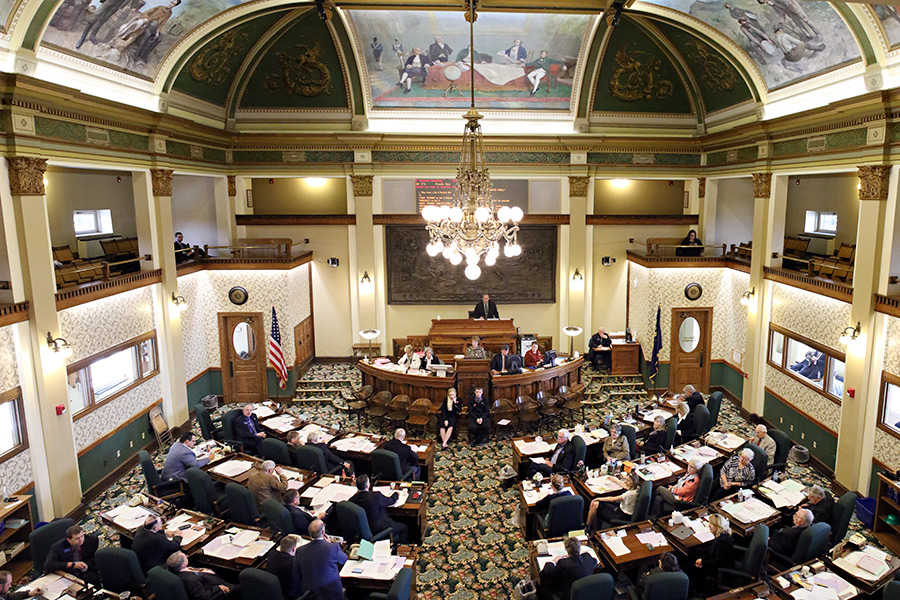The Montana Legislature will not convene for a special session to resolve rising residential property taxes after a majority of legislators failed to approve a poll sent out by the secretary of state last month.
Fifty-five state legislators voted in favor of convening for the special session, and 67 voted against. Twenty-eight legislators did not respond to the secretary of state’s poll.
The call for a special session came from the Montana Freedom Caucus, a 21-member conservative faction of the state’s Republican Party, who argued in a Nov. 19 press release that rising property taxes are imposing an undue burden on taxpayers, which must be remediated through legislative action. The caucus called for a return of the 2023 tax surplus to taxpayers, the construction of a “Taxpayer’s Bill of Rights,” clarification on the state’s property tax mill laws and a reduction in the school equalization mill funding collected each year by the state.
In a Jan. 2 press release, the Freedom Caucus expressed disappointment in the results of the poll and encouraged “Montana citizens to remember these votes as primary elections occur in 2024.”
“The Taxpayer Bill [of] Rights could have ensured that excess tax revenues are automatically returned to taxpayers without the need for further legislative action. It would also provide relief for property taxes,” the press release said.
The conservative caucus’ push for a special session arrived in the midst of months of conflict between the governor’s office, state legislators and local officials over who is to blame for rising property tax bills that have strained the wallets of Montana homeowners.
The median residential property owner is set to pay around 21% more on their taxes this year than they did last year. Increases in residential tax bills will range from $98 to $660, according to analysis by the Montana Free Press.
Though members of the Freedom Caucus painted the special legislative session as a productive forum from which lawmakers could solve the state’s property tax woes, lawmakers at the state and local level remained split on the proposal.
Gov. Greg Gianforte during a November visit to Kalispell declined to weigh in on whether or not he supported the special session and told reporters that property tax increases are not the fault of the state, but are due to out-of-control spending by municipal and county governments.
“Property taxes don’t go to the state. They’re a function of local spending and voter approved mill levies. So, if we’re going to tackle high property taxes, we’ve got to deal with local spending and voter approval of local mills,” Gianforte said.
The governor also told reporters that the $675 property tax rebate made available to Montana taxpayers for their 2022 and 2023 property taxes “more than compensates for the appraisal increases that most homeowners are seeing.”
Local lawmakers in recent months have pushed back on the governor’s portrayal of out-of-control local spending, arguing that the executive branch has erroneously blamed municipalities for collecting taxes at rates that are cemented by the state. The Montana Association of Counties earlier this fall unsuccessfully sued the state in attempts to lower the amount of state-level school equalization taxes that counties are required to collect from property owners. The Montana Department of Revenue this year directed counties to collect a full 95 mills of the tax, which is set to bring in nearly $100 million in additional revenue in the wake of exorbitant property value increases.

The Montana Senate Democrats on Friday released a statement criticizing the “failed call for a special session that was full of tax gimmicks that didn’t reduce property taxes or address the huge shift of property taxes from the rich and corporations onto the backs of working Montanans.”
Democrats in July unsuccessfully requested that the governor call a special session to address rising property values in anticipation of tax increases. One Democratic lawmaker voted for the special session called by the Freedom Caucus.
Despite the failure of the special session poll, Montana Republicans on Tuesday lauded a number of tax reduction bills that went into effect on Jan. 1.
Newly implemented legislation includes Senate Bill 399, passed during the 2021 legislative session, which ties Montana taxable income to federal taxable income. The bill also reduces the number of income tax brackets to two, applying a 4.7% tax rate to earners with $20,500 ($41,000 for married couples filing jointly) or less of taxable income and a 5.9% tax rate for those with a taxable income over $20,500.
Senate Bill 121 lowered the top income tax rate from 6.5% to 5.9% and increased Montana’s Earned Income Tax Credit from 3% to 10% of the federal credit.
Republicans in the Jan. 1 press release said that income taxes are levied by the state and that both income and property tax rebates provided in 2023 and 2024 were paid for “by a budget surplus of excess income taxes.”
The Legislature began the 2023 session with a $2.5 billion budget surplus due in part to unexpectedly high income tax revenue.
“Many people don’t understand that the property tax relief that was called a ‘rebate’ wasn’t a rebate of property taxes paid, but was actually funded by income tax money,” Sen. Greg Hertz, R-Polson, who chairs the Senate Tax Committee, stated in the release. “State government doesn’t collect property taxes to fund its services; that’s done by counties, cities, and school districts.”
“I’m excited to continue working on property tax relief beyond what the Legislature has already done, but it’s important for Montanans to understand that anything the Legislature does on property taxes is in response to local governments’ and schools’ needs and budgets, not state government spending,” Sen. Jason Ellsworth, R-Hamilton, stated. “The income tax cuts that just went into effect are the result of the spending that the Legislature directly controls: the state’s budget.”
The full vote breakdown of the special session poll can be viewed below.
